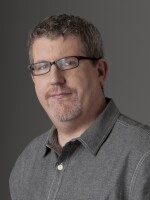I met Anthony Shadid in Baghdad, when NPR and The Washington Post were sharing a house. At dinner, he would often bring a fascinating guest, someone who had helped reshape modern Iraq, for good and ill.
I clearly remember sitting one night with the man who revived the famed Iraqi marshes after the U.S. invasion. He had broken the berms built by Saddam Hussein as he drained the marsh with a backhoe. For a year, he was convinced he drowned the marshes, destroying them forever. Only red twigs poked out of the muddy water. But then the marshes were reborn.
The story was shocking, fantastic — and unreportable. The man Anthony introduced me to had a position in Iraq and a vision for a better nation, and both would be endangered if I ever said his name on-air. Anthony turned to me and said, "You can't report this. Seriously." And I haven't.
On another occasion, Anthony told me about a cafe with a piano where intellectuals gathered to debate the issues of the day. "Old Baghdad," he told me. "Fantastic radio piece."
He was generous to a fault, inviting me to his home in Lebanon and his upcoming wedding. I asked him to my family home on Massachusetts' Cape Cod and to a real New England clam bake. None of that happened — we were both always too busy. I heard about the birth of his second child with his incredible wife, Nada Bakri, a fellow journalist.
I was in Libya weeks after he was captured there. I was in Egypt for the revolution that he wrote about better than any other American.
Anthony was an outstanding writer, and a wonderful talker I could listen to for hours. I would read his long pieces about places I had been in Iraq and come away knowing that I had fundamentally misunderstood what I had seen. He would regale me with tales of the history of Lebanon, the intersection of water and power in Baghdad, and what he thought the Iranians were really after.
Anthony grew up in Oklahoma. He told me once how a Lebanese community took root there, and it astonished me as much as when he told me the story of how he rebuilt his family home in Lebanon, which will be published as a book next month. I can't wait to read it.
But, to me, Anthony's most powerful legacy is his generosity of spirit, his optimism about a world whose dark side he knew well, and his penetrating insight into what made people tick.
I'm sure that I am only one of hundreds of people who thought of him as a friend. He was that kind of guy. I certainly didn't know him half as well as I would've wished. I always thought we'd have time.
I miss him already. His absence hurts not only his family and friends but also our nation, which is poorer for having lost his voice.
Copyright 2022 NPR. To see more, visit https://www.npr.org. 9(MDAzMjM2NDYzMDEyMzc1Njk5NjAxNzY3OQ001))







